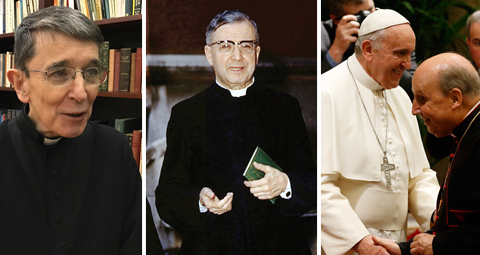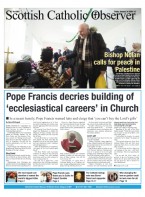January 20 | ![]() 0 COMMENTS
0 COMMENTS ![]() print
print

The Glasgow-based priest who will help elect the next leader of Opus Dei
DERMOT GRENHAM talks to Glasgow-based priest Fr Stephen Reynolds, who will travel to Rome next week to be one of only 150 electors who will cast their vote for the new head of ‘the Work’ to succeed the late Bishop Javier Echevarria
A GLASGOW-based priest will be among the select few to choose the new head of Opus Dei next week in an epoch-changing moment for the Catholic organisation.
Fr Stephen Reynolds, who has lived and served in Glasgow for the last 15 years, is one of only 150 electors, a limited number which will meet on January 23 to vote for the new Prelate, a decision which must then be confirmed by the Pope. The previous Prelate of Opus Dei, Bishop Javier Echevarría, died in Rome on December 12 after a short illness.
He had been the head of Opus Dei since 1994, having taken over from Blessed Alvaro del Portillo, who in turn was the successor of St Josemaría Escrivá, the founder of Opus Dei, or ‘the Work’ as it is often familiarly called, following his death in 1975.
In the 88 years since its foundation, Opus Dei has only had three leaders, who had been close collaborators since the mid-50s. In this sense, the election of the next prelate can be seen as, in some ways, breaking new ground as he will be the first head not to have worked with the founder personally.
The election of the new prelate will take place in Rome. On January 21, a plenary session of Opus Dei’s council for women in the prelature will take place, which will present to the elective congress a list of suggestions for candidates.
The voting of the elective congress will then begin on January 23. The 150 electors are chosen from around the world from the countries where Opus Dei has established centres.
The electors have to be at least 32 years old and have been members of the prelature for at least nine years.
Fr Reynolds has been an elector since the middle of the 1960s. He took part in the elections of both Blessed del Portill and Bishop Echevarría. He recalls that both occasions were very spiritual with a lot of prayer being offered up to the Holy Spirit asking for light to be able to choose the right successor. They were also occasions where he could really sense the diversity of characters and personalities in Opus Dei.
“This diversity, rather than being a problem, is something that was very much part of what St Josemaría wanted for Opus Dei and is completely compatible with being united on the essential aspects of the spirit of Opus Dei such as the sense of divine filiation, the search for sanctity in the ordinary circumstances of each day, and everyone, whether priest or laity, having a lay mentality and priestly soul,” Fr Reynolds said.
He is looking forward to meeting the other electors, some of whom—perhaps not too many—will have participated in the previous two elections, while the majority will be attending their first
election. Only a priest can be elected as the Prelate. He must be at least 40 years old and a member of the congress of electors. He has to have been a member of Opus Dei for at least ten years and a priest for five years.
The new Prelate has to stand out for the way he lives the virtues of charity and prudence, for his life of piety, love for the Church and her Magisterium, and fidelity to the spirit of Opus Dei. He also needs to possess a deep culture, both in ecclesiastical and civil studies, and the requisite gifts for pastoral government.
Thinking back to the elections in 1975 and 1994, Fr Reynolds remembers that, for him, the decision of who to vote for was fairly straightforward. Blessed del Portillo had been St Josemaría Escrivá’s right-hand man almost from the day he joined Opus Dei in 1935, and St Escrivá expected that he would be his successor. The same was the case almost 20 years later when the turn came to elect the successor of Blessed del Portillo.
He wonders if history will repeat itself yet again and see the ‘number two’ in Opus Dei elected. If this were the case then it would be Mgr Fernando Ocariz, the current auxiliary vicar of Opus Dei, who would be elected.
While Mgr Ocariz himself has said that ‘it’s true that this was the case in the previous elections,’ he also urged caution. “I think this was due to the special situation of the first two successors, who were formed directly by St Josemaría,” he said. “The electors voted in conscience for these persons. It wasn’t an automatic process. It seemed best to them to elect those who had worked most closely with the founder. Now circumstances have changed somewhat.
“The new Prelate won’t be someone who worked so directly with the Founder as Blessed Alvaro and Bishop Javier did, although they may have known and interacted with him.
“In my opinion, the elective Congress has before it many worthy candidates, who have the virtues and the prudence needed to take on this responsibllity.”
Once the electors have agreed on their choice, the name of the person chosen will be sent right away to Pope Francis, since the confirmation of the Holy Father is required. Though the new Prelate will not have worked or lived closely with the founder, Fr Reynolds does not think that this will be a problem.
“I heard Bishop Echevarría tell the members of Opus Dei that ‘Opus Dei is in your hands, in the hands of each person in the Work,” he said.
“He said this to men and women; married, single and priests and those who had been members for many years and those who had recently joined.
“This call to personal responsibility now becomes even clearer. All of the faithful of the Opus Dei have to put into practice, in their own lives, right where they are, the teachings of St Josemaría.”
Fr Reynolds knows that the new Prelate will be able to rely on the prayer of the faithful of Opus Dei and of so many other people. He will also have the support of the people he will be working closely with because collegiality in government is a key feature of St Escrivá’s legacy.
Following the election, Fr Reynolds and the other electors will remain in Rome for a few days.
He says that part of this time will be used to appoint new central government councils, one for men and one for women, and to review how the formation and apostolic activities carried out by members of Opus Dei around the world are developing and whether they are meeting the needs of the people of today and responding to the call from Pope Francis to go out to the peripheries. He agrees with what Mgr Ocariz said when asked about the main challenges facing whoever is elected as the new prelate.
These will be to help each person in Opus Dei to learn to build up the Church in their own place of work and professional environment, in the world of culture and the family and also to spread peace and joy in today’s world so much in need of hearing the Good News of God’s love.
PHOTO: Fr Stephen Reynolds; Bishop Javier Echevarria with Pope Francis; and founder St Josemaria Escriva










